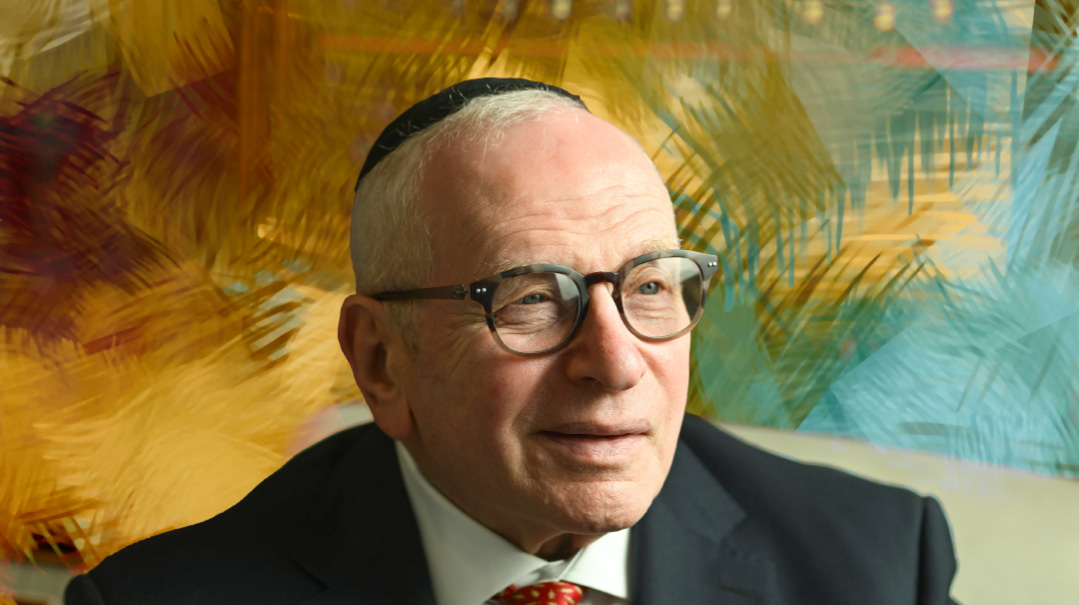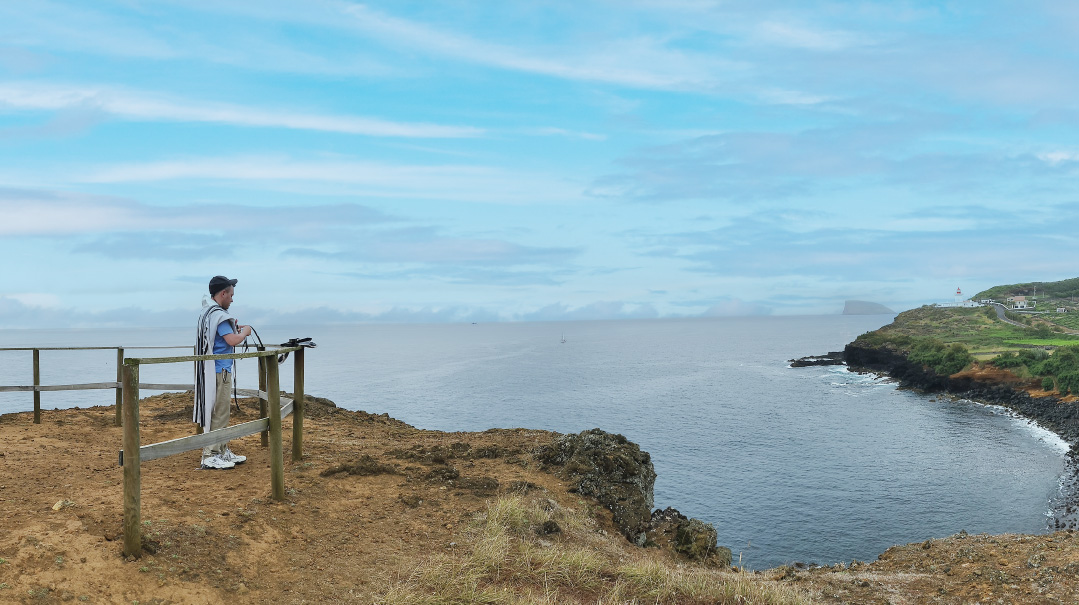Rising in the Sunshine State
| December 14, 2021Is Florida Governor Ron DeSantis the next face of the GOP?
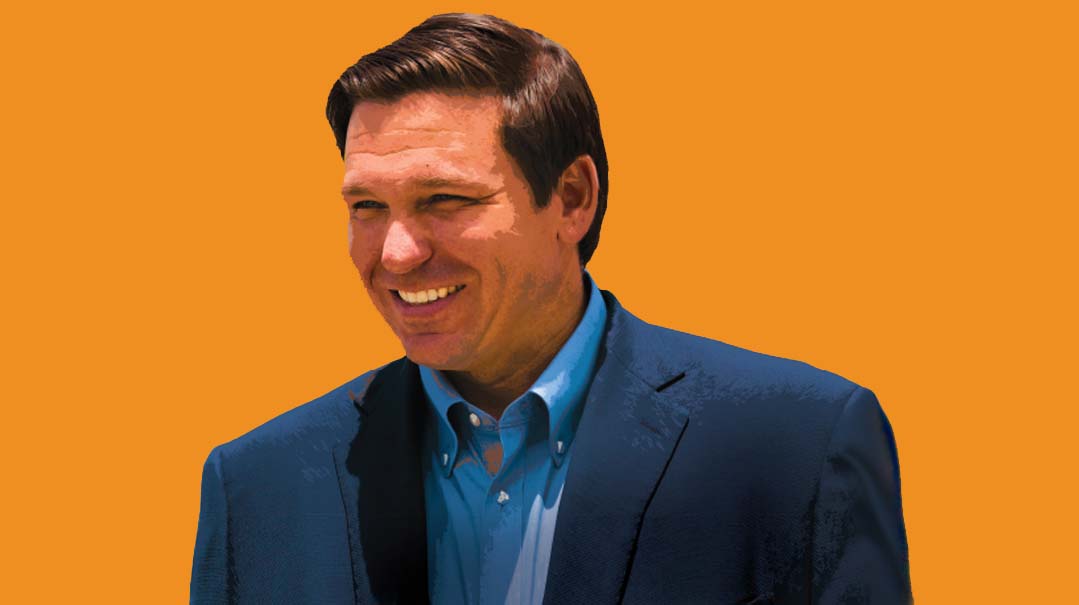
Photos: AP Images
It was the mid-August height of America’s latest Covid surge, and the White House was scapegoat-hunting.
Having campaigned on a promise to bring the pandemic under control, Joe Biden was forced to watch the rapidly spreading Delta variant wreck the “summer of freedom” that he’d promised. But the administration’s response — advocating masking for schoolchildren, as well as vaccine mandates — met a rising tide of conservative opposition.
In a Republican Party fiercely opposed to those policies, one voice in particular made itself heard: the trenchant tones of Florida governor Ron DeSantis.
“We can either have a free society, or we can have a biomedical security state,” declared the first-term governor.
The Biden administration knew a foil when it saw one, and so it decided to hit back at the man whose laissez-faire pandemic policies in the nation’s third-most-populous state had garnered him the moniker “DeathSantis” on the left.
As one commentator memorably said of DeSantis: “Having made himself the national face of the anti-Biden Covid-response resistance — the president decided to punch it.”
The chance to strike that blow came a few days later at a press gaggle on the White House lawn. “What do you think of Governor DeSantis saying he is going to block interference from the federal government?” asked one reporter.
Joe Biden’s response was a well-timed put-down. Narrowing his eyes and leaning forward with a smile, he replied: “Governor who?”
The appreciative laughter from the press pack told Biden that he’d scored, but all concerned recognized that it was a back-handed compliment. Because a year after Donald Trump left office, Ron DeSantis has emerged as one of the highest-profile Republicans after the former president himself.
Surging ahead of Trump administration veterans Mike Pence and Nikki Haley, he’s polling behind only Trump in the race to be the party’s 2024 candidate. “Donald Trump remains the king of the GOP,” editorialized Politico, but “Florida Governor Ron DeSantis is looking like the crown prince.”
At 43 years old, he’s a young pretender to the throne, but the growing grassroots support isn’t just political hype. With Republicans out of power at the national level, action has shifted to the states, and on that stage Ron DeSantis has proven the biggest performer.
Unlike big Democratic states like New York and California, Florida’s schools were open for the whole of last year, business and entertainment venues operate as usual, and the governor has banned mask mandates. While DeSantis promoted vaccines early on, he’s since refused strong-arm tactics, even for health care workers, instead touting monoclonal antibody treatments.
In the partisan battle over public health versus individual rights that the pandemic has now become, the governor has become one of the most coherent champions of personal freedoms.
Covid has supercharged DeSantis’s rise, but the congressman-turned-governor has also drawn the spotlight by his running battles with the mainstream media and solidly conservative credentials. On everything from gun laws to immigration and the Iran deal, he’s in lockstep with his party’s right.
And as the governor of a large and growing Jewish community, he’s gathering attention from Orthodox donors as well. They’re impressed by his unapologetic defense of Israel, the natural empathy that he showed to the hard-hit Jewish community amid the Surfside disaster, and his support for school choice, which has lightened the burden for hard-pressed parents.
Three years out from the next election, multiple conversations with Florida politicians and community leaders, both on and off the record, painted a more nuanced picture of the rising star than the “mini-Trump” label bestowed by the media. “Driven,” “ideological,” and “genuine” came up frequently, but so did “competent.”
“He’s got very similar policies to Trump but without the constant Twitter use,” says state representative Randy Fine, the only Jewish Republican legislator in Tallahassee.
But for all DeSantis’s promise, there are obvious shortcomings for a politician shooting for the top job. “He’s not a back-slapping, retail politician like Joe Biden, who projects a down-to-earth persona. Can he connect to voters beyond the conservative base?” asked one person who’s interacted with him.
And looming over all the chatter about a 2024 election run is the elephant-in-the-room: Will the former president himself run? And can anyone whose name isn’t Donald Trump succeed in today’s GOP?
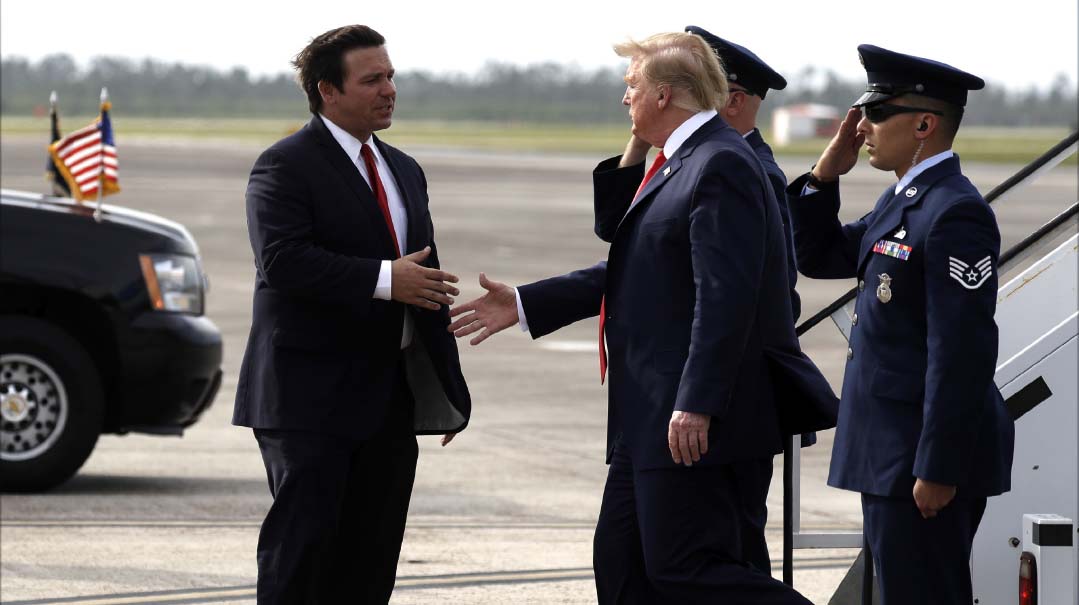
Driven to Succeed
The story of Ron DeSantis’s rise is a short one, partly because it’s been so swift, but mostly because DeSantis himself isn’t a storyteller.
“He’s highly strategic and doesn’t do anything unless it fits in with his fundamental vision,” said Dr. Allan Jacob, chairman of Teach Florida, an OU advocacy organization for nonpublic schools who served on DeSantis’s transition team after the 2018 gubernatorial election.
Just how far-ranging that vision was, says Dr. Jacob, a member of the Miami Beach Orthodox community, became clear in an anecdote about DeSantis’s baseball-playing days that Jacob heard from Jeb Bush — a former governor of Florida — who heard it from DeSantis himself.
“Jeb told me that at Yale, DeSantis was captain of the baseball team. He knew George H. W. Bush held the same position, and DeSantis felt that this would be a good path to follow. He looked up to President Bush and wanted to emulate him.”
Born in 1978 in Jacksonville, Florida, to parents of Italian descent, Ronald Dion DeSantis’s upbringing was far from the big leagues; his position is testament to hard work and America’s social mobility.
In a recent interview with Ben Shapiro that took place against the solemn backdrop of the Florida State Capitol, the Orthodox talk show host elicited a few morsels of personal history along with DeSantis’s fluent conservative rhetoric.
“I grew up in Dunedin, Florida, in a blue-collar home,” the governor said of a father who installed Nielsen TV ratings boxes and a mother who was a nurse. “When I was younger, I didn’t have a political philosophy. I instinctively loved America because that’s what you did. We were a Catholic family who went to church on Sunday.”
That patriotism and religiosity laid the groundwork for a politically conservative orientation to emerge as soon as those core beliefs were challenged.
“I was a baseball player and ended up going to Yale to play,” he continued. “It was a massive culture shock. The motto was ‘For G-d, for Country, and for Yale,’ but they were actively opposed to anybody who believed in G-d, they hated the United States, and everything was about how bad the country was. Being exposed to that raw leftism turned me off.”
Talking about his philosophical influences, it’s immediately clear why DeSantis has become a leading member of the “Ivy League Populists” — the left’s pejorative for conservatives with an elite education.
“The books that shaped me were firstly those from my religious tradition, which were the foundations of Western civilization,” he told Ben Shapiro. “Then I studied the Founding Fathers and works by John Locke and watched them create this country on their shoulders.”
Reporting for Duty
Graduating Yale in 2001 with a BA in history, DeSantis first spent a year teaching at a school in Georgia and then headed for Harvard Law School.
But instead of opening the door to a lucrative career in law, Harvard proved to be the first step in public service. Graduating in 2005, DeSantis enlisted in the Navy Reserve as a lawyer in the Judge Advocate General’s Corps. Although not a combat role, the turn to the military was a harbinger of the pugilistic, no-holds-barred style that he was to bring to politics.
Lieutenant DeSantis first worked in the legal processing of 9/11 detainees in Joint Base Guantanamo, and then headed for Iraq, where he served as the legal advisor to the commander of SEALs as part of the troop surge in Fallujah in 2007.
The 30-year-old lieutenant’s Middle East service was 1,000 miles to the east of the Jewish state, but when it ended after an honorable discharge in 2010, Israel advocates soon began to notice DeSantis when he entered the political world. In November 2012, he was elected to represent Florida’s Sixth Congressional District.
“I sometimes say that it was a momentary lapse of judgment,” DeSantis told Shapiro of his entry to politics — the hint of deadpan humor marked by a faint smile — “because my first foray into politics was running for Congress with no name recognition or money, and after serving three terms, I became governor.”
The wry smile makes a reappearance as DeSantis talks about his attempt at a career-launching book.
“It was during the Obama years in 2012, and I saw that the direction the country was going was away from what the Constitution wanted. So prior to my bid for Congress, I wrote a book about how Lincoln and Reagan applied the principles of American government.
“It was read by about a dozen people at the time.”
Man of Principle
South Florida political and business consultant Eytan Laor, a political conservative and pro-Israel activist —well-known in those circles and on Capitol Hill — got to know the new congressman early on. In Republican strategist Nick Muzin’s words, “Eytan’s known Ron DeSantis since the time when it was a big deal for Ron to say that he knew Eytan.”
The Israel-born, American-bred Laor operates as a “bundler,” a political fund-raiser who collects contributions from multiple donors, and in that capacity, he began working for DeSantis not long after the then-freshman representative was sworn into Congress. What convinced him to affiliate with the Florida congressman was the same commanding presence and drive that comes up in every conversation about DeSantis today.
“It was apparent to me from early on that he was highly intelligent, disciplined, and goal-driven, with lofty aspirations,” says Laor. “He was not the type to relent until he achieved his highest goals.”
Laor say these attributes were on full display for a host of others to see when DeSantis entered the 2016 race for the US Senate.
Laor served as fundraising consultant to the DeSantis campaign, as well as a lay leader on his foreign policy advisory council during the congressman’s brief run for Marco Rubio’s Senate seat. When Rubio withdrew from the presidential race and decided to run again for his Senate seat, DeSantis ended his Senate bid and ran for reelection to his House seat.
During that same 2016 election cycle, Laor was also active with the Ted Cruz presidential campaign, serving as the Texas senator’s largest Florida bundler. Knowing that DeSantis’s conservative bona fides would appeal to Cruz supporters, Eytan connected DeSantis to several of them at events and meetings around the country. Throughout those interactions, DeSantis proved to be a hit, and — aside from his stellar credentials — the reason was simple.
“He’s unwavering in his principles,” Laor explains. “He doesn’t pander, he does what he says, and there’s no confusion or ambiguity about where he stands on things. That’s what attracts people to him.”
BDS Backlash
When ice cream manufacturer Ben and Jerry’s announced a BDS-inspired boycott of Israel in mid-summer this year, two things happened. One was a deluge of media puns about “meltdowns,” and the other was interest in how Ron DeSantis would react.
The Florida governor’s fight against the Israel boycott goes back years and involves someone who’s become a friend and political ally.
“I first met DeSantis about nine years ago when he was a new congressman,” says Gabe Groisman, the mayor of Bal Harbour Village in Miami-Dade County. “I had dinner with him and his wife together with Matti Dan of Ateret Cohanim, and I could see straight away that DeSantis was different from most elected officials. He was very smart, well read, and direct, and had an intimate understanding of Israel and the Middle East. He didn’t need convincing of Israel’s position at all.”
It was the anti-BDS struggle that developed the relationship between the two. Groisman — like DeSantis, a lawyer by training — wrote and passed America’s first municipal anti-BDS bill. It’s a distinction marked by a Wikipedia entry that places the Florida town alongside states like Kansas and Kentucky in a list of jurisdictions with such laws, which went on to be copied across the country.
Their paths crossed again when the mayor and the congressman ended up speaking at the same anti-BDS event.
Then in the 115th Congress, (2016–2018) when the GOP held a House majority, DeSantis served on the House Foreign Affairs Subcommittee on the Middle East, North Africa, and Global Counterterrorism. He took an exploratory trip in August 2017 to scout out locations in Jerusalem to relocate the US embassy there. In his capacity as Middle East advisor, Groisman accompanied DeSantis.
But it was home rentals giant Airbnb’s decision to ban listings in the West Bank in 2018 — the first significant victory for the BDS movement — that brought DeSantis’s leadership on the issue to the fore.
The incoming governor recognized the breakthrough for the threat it represented. “The day after being confirmed as governor-elect,” says Gabe Groisman, “DeSantis issued a strong statement protesting the ban.”
He followed that up about a week after his January 2019 inauguration with an order to officials not to use the company for state business. “Airbnb claims it’s a company of inclusion, and yet this policy only affects Jews who have homes on the West Bank,” DeSantis charged. “It doesn’t appear to apply to anyone else on the face of the earth.”
A few months later, Airbnb backtracked on its ban, notching a victory for the anti-BDS movement.
The struggle continued though, and in July this year, the board of Ben and Jerry’s, the ice cream manufacturer, announced their decision to boycott Israel’s West Bank population. This time, reflecting the emergence of woke corporations, DeSantis’s order to state authorities to cease business with the company was more aggressively worded.
“Florida is sending a message to corporate America that we will defend our strong relationship with the Jewish state,” he said. “I will not stand idly by as woke corporate ideologues seek to boycott and divest from our ally, Israel.”
It remains to be seen whether the ice cream company will retreat as Airbnb did, but the clash marked Governor DeSantis’s emergence as a standard bearer in the anti-BDS struggle.
“This was not a hat tip to a Jewish electorate,” says Gabe Groisman. “He just understands that large public companies trying to destroy Israel are a very bad thing, and he is determined to act on his own. His passion for the Jewish People and Israel is genuine.”
DeSantis’s stance in the ongoing BDS battle prompted Groisman, ahead of a 2019 trade mission that the governor led to Israel, to praise DeSantis at a meeting of the local JCC for his dedication to the Jewish state.
“I just want to assure everyone here,” he joked to the Jewish audience, “that Governor DeSantis is an honorary Jew.”
You don’t need to search for the formational moment that tipped DeSantis into the pro-Israel orbit, explains political consultant Jeff Ballabon.
“What I learned in the ’90s is something that a lot of Jewish people are not exposed to, which is that in the worldview of 50 to 70 million Americans, Israel plays an important role. Whether that’s overtly religious, in which case it’s a Christian idea, or conservative-based. That’s the world that produced Ron DeSantis.”
Corporate Raider
Even before his run-in with CBS’s famed 60 Minutes program in April this year, Ron DeSantis was no fan of the “corporate media,” as he calls it. But his excoriating takedown of the media delighted his growing fanbase and started to define Brand DeSantis.
It all began as part of a vaccine rollout that saw the governor turn to various outlets including drugstores and Publix — a chain of local supermarkets — to get shots into arms as quickly as possible. Combing open-source campaign records, some media outlets latched onto the fact that Publix had donated $100,000 to DeSantis’s PAC.
“Why is awarding a contract to a donor not pay-to-play?” charged a CBS reporter during a DeSantis press conference at a Florida airport.
In reality, DeSantis then gave a detailed explanation of why Publix was merely one of the many chains receiving state contracts.
But that detailed response was cut from the 60 Minutes report. Instead, CBS edited three and a half minutes from the press conference footage to jump to the governor’s impatient rebuttal to a follow-up question from the reporter, in an effort to make DeSantis appear both overbearing and defensive.
“It’s wrong, it’s wrong — it’s a fake narrative,” he responded to the reporter in the clip, which went viral. “I just disabused you of that narrative and you don’t care about the facts.”
When the reporter continued her line of attack, De Santis drowned her out. “No, no, no! You’re wrong, you’re wrong!”
He concluded, turning to another reporter. “Yes, sir!”
Hands moving side-to-side with a gesture seen by many as noticeably Trumpian, it was trademark DeSantis — a fluent, forceful denunciation of the entire mainstream media.
Walking briskly into a follow-up press conference, radiating bulky confidence, he got straight down to business.
“These are smear merchants,” he said about the episode, “and that’s why nobody trusts corporate media.”
The denunciation was a display of what the 43-year-old brings to the table. Intriguingly, the governor is a “good, intelligent listener” in conversation, according to Teach Florida’s Mimi Jankowitz, who’s worked with the DeSantis staff on school choice.
But in a speaker low on Obamaesque oratory or Trump’s edge-of-the-seat quality, DeSantis’s combativeness — his willingness to counterattack and parry each thrust with a clash of rhetorical steel — is one of his main strengths.
Empathy Revealed
It took the Surfside disaster in late June to reveal another side to the hard-charging politician. A week after the fatal Tuesday night, the massive pile of rubble that had been Champlain Towers South was crawling with rescue personnel, and grief-stricken families were still hoping for a miracle, when the phone rang at the Chabad of Aventura, a few miles to the north.
On the line was Governor Ron DeSantis’s staff with a request. The governor had spent hours with the desperate families over the previous week, cutting red tape to expedite disaster relief and personally authorizing an Israeli rescue team to fly in. Now he wanted to visit the shul over Shabbos and spend time with the shocked community, which contained some of the bereaved families.
In an exchange that wasn’t reported at the time, says Mayor Gabe Groisman of neighboring Bal Harbour, DeSantis’s scheduler was told that, yes, the governor would be welcome — on one condition. Given that it was Shabbos, the visit would be off limits to media, and no pictures allowed.
So that Shabbos, the shul in the Miami suburb witnessed a moving sight: The most powerful man in America’s third largest state spent several hours listening and talking to the harrowed families — and saying Psalms.
“That tells you a lot about the governor,” says Groisman. “There was no media play here — he just wanted to do the right thing.”
Rabbi Sholom Lipskar, who’s the founder of the Shul of Bal Harbour in Surfside as well as the Aleph Institute, which advocates for both Jewish prisoners and military personnel, was witness to the same instincts.
“It was 2 a.m. when the tower came down,” he remembers. “That ushered in the worst months of my life. People were hoping for a miracle, that their loved ones were still alive. There was no way to console people in that twilight zone.
“The governor came to the community and brought me a personal check for emergency needs of the Surfside survivors. He made himself available on an individual basis to families of the missing.
“From many days’ interaction it became obvious that this wasn’t motivated by political optics — it was real leadership, it was because he cared. He also personally pushed for the Israeli rescue team to be allowed to come, despite local objections. You have to understand that Florida is the number one search-and-rescue place in America.”
In retrospect, says Rabbi Lipskar, it was Hashgachah that the relationship with the governor bore fruit when it did.
“I met him first when he was running for governor. I’m chair of the Aleph Institute, which has chaplains in the military, and DeSantis was of great interest to us because of his military background and strong relationship with religion. We invited him to speak to the community.”
Once in office, DeSantis advanced two issues with which Rabbi Lipskar had been involved in a lobbying effort.
“The first was religion in school: The Lubavitcher Rebbe said that we as a society had removed G-d from public spaces based on tenuous objections, so we advocated for a moment of silence in school for students to ‘reflect and be able to pray as they see fit.’ That was rejected over and over again by the left. The governor signed that bill into law in our synagogue.”
According to a local media outlet, the governor said at the ceremony, “The idea that you can just push G-d out of every institution and be successful, I’m sorry, our Founding Fathers did not believe that.”
The second bill signed into law at the event related to emergency health care. The Miami Jewish community has a Hatzalah service, and so it came about that ten days before the Surfside tragedy, Florida recognized faith-based emergency responders as emergency services — which meant that rescue volunteers had legal access to the site that became a mass grave to many Jews.
School Choice A story that appeared recently in these pages told of a New York politician who hit the campaign trail, convinced that the path to electoral success in any Jewish neighborhood was to talk up his love of Israel. The problem, the politico discovered, was that his Satmar audience didn’t feel quite the same way about it. Kitchen table issues, it turns out, are of prime importance to religious Jews — sometimes as much as Israel.
So while Florida’s Orthodox community appreciates the governor’s pro-Israel stance, they’re also keen to praise his approach to local issues — with school choice looming large.
Teach Florida chairman Dr. Allan Jacob explains that Florida has one of the country’s most successful school choice movements. The state provides close to $1 billion in funding to non-public schools, about $41 million of which goes to some 40 to 50 Jewish parochial schools under a variety of school choice programs, including six scholarship programs.
Dr. Jacob has met with Governor DeSantis many times, including after his victory in the gubernatorial race when DeSantis and Lieutenant Governor–Elect Jeanette Nuñez visited the Brauser Maimonides Academy, an Orthodox day school in Fort Lauderdale. DeSantis made this the venue for his first visit to South Florida after his victory was certified. The purpose was a roundtable discussion on safety with school staff, and he promised to continue security funding at Jewish institutions in the wake of the Pittsburgh synagogue shooting which took place a month earlier.
Dr. Jacob says he has always been impressed by DeSantis’s intelligence and “uncanny ability to absorb large amounts of information and then come up with his own perspective.”
He experienced this firsthand through an encounter between DeSantis and John Kirtley, sometimes nicknamed the “godfather” of school choice in Florida. Kirtley is a venture capitalist and chairman of a school voucher program called Step Up for Students. Back when he was a member of Congress, DeSantis didn’t need to be up to speed on the issue — education is largely under state control in the US — but when he was running for governor, he needed to learn the topic well.
DeSantis reached out to Kirtley. As Allan Jacob tells the story: “He calls John and says, ‘Teach me about school choice.’
“John said, ‘Congressman, this is going to be a lengthy conversation, it will take an hour and a half.’
“ ‘I got time,’ DeSantis said.”
Kirtley gave the candidate a seminar-style talk for an hour and a half on school choice. When Kirtley hung up, he was unsure what DeSantis really grasped.
“A few days later, John attended the conference where DeSantis was on the panel and he proceeded to discuss school choice,” says Jacob. “He had integrated everything Kirtley told him, fashioned it into his own conceptions. He had quickly become an expert.”
That expertise has paid dividends for Florida’s Orthodox families. The move to fund non-public schools began in 2001, with the passage of the Florida Tax Credit Scholarship, and the program received backing from successive governors since. But under DeSantis, there has been a large increase for eligibility.
According to Representative Randy Fine, who worked on the school choice legislation, “We increased dramatically the income envelope for parents to qualify. If you’re a family of six, you can now get about $7,000 per child as a check that goes to the school to be spent on tuition. You can make $136,000 and still qualify.”
It’s all of a part with Governor DeSantis’s pro-parents ideology, says Fine. “He believes in parents’ rights, that government shouldn’t be dictating, and that ranges from school choice to Covid policy.”
The impact of the voucher system, says Rabbi Moshe Matz, who heads the Agudah’s Florida office, is extremely significant. “Chinuch is a central component of every Jewish family. It’s a built-in expenditure like health insurance and a mortgage.
“These vouchers are half of the $13,000 to $14,000 that tuition costs, and it means that our schools are thriving. They have the stability of a guaranteed tuition base.”
That shot in the arm, says Rabbi Matz, is courtesy of the governor’s ideology that education is something that state needs to guarantee for all. “It’s irrational that because of the separation of church and state that private schools are defunded. He sees that something needs to be provided for everyone.”
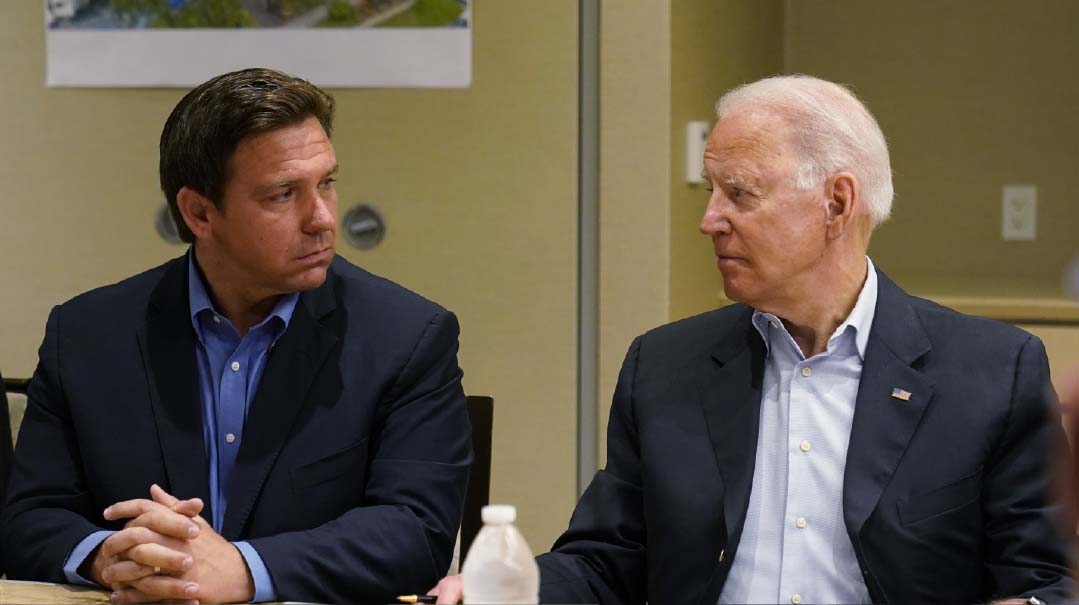
Florida Freedom
Given the story that Ron DeSantis could tell about Israel, school choice, and Surfside, it’s notable, say Orthodox interlocutors, that this isn’t now a focus of their conversations: Instead the governor is consumed by the failings of the Democrats’ Covid strategy.
As big Democratic states like New York and California and the Biden administration itself continue to push a raft of invasive pandemic control measures, DeSantis has flown the flag for an alternative public health approach.
Throughout the late summer and fall of this year, DeSantis and Joe Biden played ping-pong with Covid restrictions: The White House legislated mask mandates, and the governor banned them, putting financial penalties in place for local school districts that went along with Washington. The administration then threatened to pay the local school districts’ penalties. The governor once again intervened.
The Florida leader’s laissez-faire stance — including refusal to consider more restrictions with the advent of the new Omicron variety — have earned him heaping doses of scorn from Democrat-leaning media outlets who accuse him of responsibility for some of Florida’s 62,000 Covid-related fatalities.
“Ron DeSantis, How Many Covid Deaths Are Enough?” read one New York Times headline. “58,000 Dead, and Depraved DeSantis Is Just Getting Started” went a counterpart at the Daily Beast.
But DeSantis isn’t rattled, saying that he champions a mix of public health policy balanced by individual freedom — a stance that has drawn strong support from conservatives nationwide.
“The distinction between liberal states and states like Florida has never been stronger,” he told Ben Shapiro, whose family recently moved to the Sunshine State to escape California’s pandemic policies.
“We barred sending sick patients back to nursing homes,” he continued, presumably contrasting New York state’s high nursing home death toll from that very cause. “But to kneecap a whole society by lockdowns and mandates, which don’t stop the virus?”
Teach Florida’s Allan Jacob, a medical doctor by training, thinks that DeSantis showed vision in carving out an independent course.
“He had his own experts out of Stanford and Harvard — totally different from the CDC and followers of Fauci. He didn’t rely on people who were panicking. Instead, he relied on Nobel Prize winners and mathematicians. He created a highly sophisticated team to carry Florida through the pandemic. It was unique.
“In the beginning, he received a lot of negative coverage in the liberal media, but his management has had no different medical outcome when compared to states that closed down. But in contrast to those states, Florida’s economy is booming and people are moving here.”
Randy Fine acknowledges that Florida is divided over the governor’s policies. “Liberals want mask mandates. But DeSantis is a national candidate because he’s been consistently correct about sending kids back to school and focusing on a mix of prevention and vaccination.”
If polls are a guide, DeSantis’s stewardship is positively perceived by a majority of Floridians. A recent poll for a Republican-aligned group conducted by VCreek/AMG gives the governor comfortable leads over his Democratic rivals Charlie Crist (47%–39%) and Nikki Fried (48%–36%) as the November 2022 gubernatorial election looms over the horizon.
DeSantis himself touts other numbers, such as the almost 34,000 New Yorkers — including Orthodox families — who relocated to Florida in the ten months prior to July 2021. “If the media and these other states were right about Covid, then people would flock to these other states. In fact, the opposite is happening.”
But the wind in his sails that DeSantis enjoys in Florida may be a poor proxy for the national stage. How would he fare if he leapt into the maelstrom of a presidential campaign?
Trump Card
In the fast-moving world of politics, a year is a long time, and four years ago is prehistoric. That’s especially true of President Trump’s Twitter endorsement in 2017 of then-congressman DeSantis in his bid for the governorship.
“Congressman Ron DeSantis is a brilliant young leader, Yale and then Harvard Law, who would make a GREAT Governor of Florida,” tweeted the president. “He loves our Country and is a true FIGHTER!”
While DeSantis has proven every bit as combative as expected, Trump now has a far-less benign view of the man three decades his junior — perhaps because of their similarities.
“DeSantis has some of the best Trumpian qualities, including an instinct for what the average person thinks, and he’s unafraid to take positions he believes in,” says Jeff Ballabon. “That’s why the media see him as every form of evil and are trying to put him down over Covid.”
According to Eytan Laor, the two share a strength of personality.
“In the current environment, in the media, and with all the craziness, you need someone like Trump to call the balls and strikes,” Laor said. “He calls out the anti-American and anti-constitution people for what they are. DeSantis speaks with authority. He doesn’t back down, and especially right now, in the Republican conservative world, we want fighters. He is a fighter, very much like Trump in that regard, but without the side noise.
“The elements of Trumpism that people like,” continues Laor, “are what he did for the economy and foreign policy — that he knows the difference between the good guys and the bad guys. And that, in my opinion, is what DeSantis shares with Trump.”
But the comparisons, cautions Groisman, can be overdone. “As we saw over Surfside, when he worked alongside the Democratic mayor who’s very outspoken over Covid, he put that aside. The media didn’t report that, but it proves that he’s working for Florida.”
King or Kingmaker?
In closed talks, Ron DeSantis is reported to say that no one in the Republican Party currently stands a chance in a primary against Trump. But despite his supremacy in the GOP, it’s not clear that the 45th president will seek to become the 47th.
Former Trump chief of staff John Kelly told Politico that the possibility of losing a second race would dissuade Trump, who fears the “loser” label above all.
Jeff Ballabon says that it’s a fool’s errand to try and read Trump’s mind, especially this early on. “It’s way too early to figure out whether Trump wants to be king or kingmaker. He was and remains completely apolitical in the classic D.C. sense — he’s a genuine outsider.”
But it’s not too early, says Ballabon, to say that DeSantis will be a very strong contender.
“My rule is that early front-runners like Jeb Bush in 2015 fade, because the hype around them comes from the Washington establishment and the donors and pundits in that bubble who rally around a D.C.-type figure. That doesn’t survive contact with ordinary voters.
“But DeSantis is in a different sphere — he’s emerged on the basis of his actions, and he’s smart and self-confident enough to be an outstanding world leader.”
Whether or not the Ron DeSantis story gets to play on an even bigger stage than Florida, only three years of America’s partisan-scarred politics will tell.
But until then, DeSantis is sure that his brand of freedom-first, no-fear-or-favor policy has the ultimate seal of approval — from the media itself.
“If you’re doing the right things, you’re standing for the principles that made this country great,” he told Fox last month, “they’re going to attack you for it.”
(Originally featured in Mishpacha, Issue 890)
Oops! We could not locate your form.

